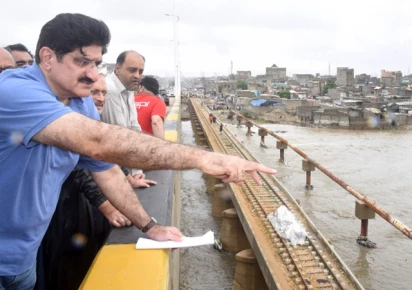Karachi’s industrial and commercial sectors experienced severe disruptions on Wednesday as heavy rains and flooding paralyzed key industrial areas of the city, causing a significant decline in production and distribution, according to reports.
Industrial leaders reported that safety concerns and transportation issues prevented workers from reporting to work, leading to a sharp drop in industrial output. Nearly half of the 4,500 industrial units in North Karachi were closed, and workers were reluctant to return to their workplaces after the torrential rains in the third week of August left several individuals stranded in factories late at night.
Around 100 to 125 factories in sectors A to D in the F.B. Area, including export-oriented units, were heavily affected as the swollen Lyari River flooded production facilities, destroying raw materials and finished goods worth millions of rupees.
Infrastructure issues compounded the situation, with roads leading to the Super Highway submerged due to the overflow from the Thado Dam. This added to the city’s existing infrastructure challenges, worsening the situation.
In the Site industrial area, approximately 60% of workers did not report to work, despite no significant road blockages. A shortage of workers led to a 25-30% reduction in production activities, with workers hesitant to return due to fears of being stranded if the rains worsened.
In the Korangi industrial area, which houses over 4,000 factories, output dropped by 30% due to a low turnout of workers, with less than half of the usual workforce able to make it to work. The area’s entry points were closed in the morning, and flooding from the Lyari and Malir rivers further disrupted business operations. Power outages, caused by tripped feeder lines, further hindered operations, leading to the suspension of multiple shifts.
In the F.B. Area, factory attendance was down by 50-60%, severely impacting production. The supply chain was disrupted, slowing the delivery of raw materials and cargo shipments to seaports.
The e-commerce sector also faced significant challenges. Delays in both domestic and international shipments were reported, and quick commerce services were suspended in many areas of the city. Power and internet outages disrupted online shopping services, causing losses for e-commerce businesses.
In wholesale trade areas such as Dandia Bazaar, Jodia Bazaar, and Lea Market, 80-90% of shops were closed, and the remaining shops closed by 2 pm due to the adverse weather conditions.
The combined impact of the flooding, rains, and infrastructure challenges has severely disrupted Karachi’s industrial and commercial sectors. If the situation does not improve, the long-term effects on the city’s economy could be substantial.























